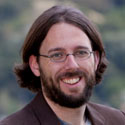Advisory Board and Editors Environmental Sciences

Ethan P White
Associate Professor in the Department of Wildlife Ecology and Conservation at the University of Florida. Moore Foundation Investigator in Data-Driven Discovery. National Science Foundation CAREER 'Young Investigators' Award recipient. Member of the Data Carpentry and Impactstory boards of directors.
My research focuses on data-intensive questions in ecology, using large ecological datasets, advanced statistical/machine learning methods, and theoretical modeling to understand ecological patterns.

Andrew Whitehead
Associate Professor in the Department of Environmental Toxicology, and Center for Population Biology, University of California at Davis. Research in Environmental, Ecological, and Evolutionary Genomics.

L. LaReesa Wolfenbarger
Dr. Wolfenbarger conducts research on the ecology and conservation of grassland species and communities in the agricultural landscape of the Great Plains. She also devotes research time to synthesizing information for policymakers and resource managers so that scientific results are readily available for decision makers.

Jianhua Xu
Jianhua Xu is Professor of Geography and Director of The Research Center for East-West Cooperation in China. He has published 16 books and more than 200 papers. He has worked as the editor of several academic journals, such as Journal of Desert Research, Areal Research and Development, Human Geography, Ecologic Science, Arid Land Geography, Chinese Geographical Science, Journal of Signal and Information Processing, PeerJ, International Journal of Ecology and Ecosolution, etc.

Hong Yang
Dr. Hong Yang is a Associate Professor in Environmental Science, Department of Geography and Environmental Science, University of Reading, UK. His research interests include the effects of climate change and human activities on water environment, water-energy-carbon nexus, and resource management. He has led and been involved in research projects funded by UK Natural Environment Research Council (NERC), Scottish Natural Heritage (SNH), European Research Council (ERC), Research Council of Norway (RCN), Chinese Natural Science Foundation (CNSF) and Chinese Academy of Science (CAS).

Anastasija Zaiko
Dr. Anastasija Zaiko's major areas of expertise are in aquatic ecology and the development and implementation of molecular tools for monitoring and surveillance. She has held leading roles in many national and international research programmes, projects and field expeditions, conducting experimental and observational studies in aquatic ecosystems employing a range of different surveillance techniques (traditional and molecular). Dr. Zaiko is a co-founder and a lead scientist at Sequench Ltd, a professional laboratory specializing in molecular analyses, biosecurity and environmental consulting.

Matteo Zucchetta
Matteo Zucchetta obtained his PhD thesis entitled "Habitat distribution models for the management of fishery and conservation concern species in lagoon environment” at the University Ca’ Foscari Venice (Italy). He has previously covered the position of researcher University Ca’ Foscari Venice (Department of Environmental Sciences, Informatics and Statistics) and at the National Centre for Coastal Zone Protection and Characterization, Marine Climatology and for Operational Oceanography of the Italian Institute for Environmental Protection and Research (ISPRA). Since 2020 he is a researcher of the Institute of Polar Sciences of the National Research Council of Italy. His work was carried out in the framework of different EU and Italian projects, and his main research topics are: 1) analysis of the spatial distribution of plant and animal species in coastal and transitional water bodies; 2) Community ecology in transitional water ecosystems; 3) Use of fish fauna assemblages as indicators of ecosystem ecological status; 4) Ecological models for food webs analysis; 5) Climate changes effects on aquatic ecosystems.

